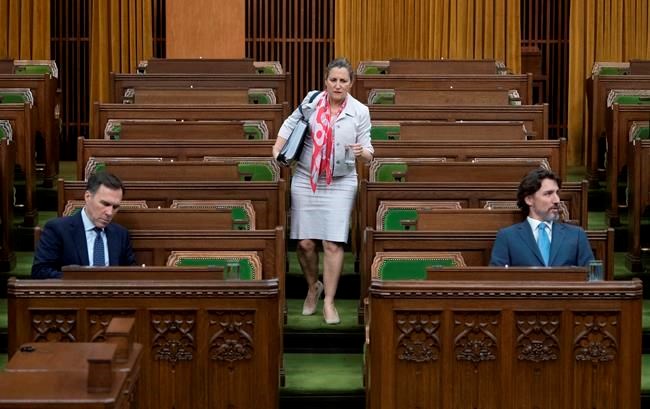OTTAWA — Deputy Prime Minister Chrystia Freeland will be sworn in as Canada's new finance minister later today.
Prime Minister Justin Trudeau is also looking to prorogue Parliament in order to come back with a new speech from the throne and an economic update in October.
The Liberal government is seeking a reset both internally and externally as it tries to recover from the self-inflicted wounds of the WE Charity debacle, and as the country looks to recover from the COVID-19 pandemic.
Multiple sources confirm to The Canadian Press that Freeland will remain as deputy prime minister as she adds the finance portfolio to her already packed list of responsibilities.
In addition to being deputy prime minister, Freeland is the minister of intergovernmental affairs in charge of restoring and maintaining a better relationship with the provinces. She is also mandated to oversee Canada's relationship with the United States.
Freeland replaces Bill Morneau, who announced Monday he was leaving the Finance post following much speculation about a growing rift between him and Trudeau.
Both Morneau and Trudeau are embroiled in ethical investigations for not recusing themselves from a decision to award a large student grant contract to WE Charity despite both having close ties to the organization.
The Trudeau government is also planning a cabinet retreat in mid-September with the intention of proroguing Parliament and presenting a pandemic recovery plan in a throne speech in early October. The government has not yet decided exactly when it will prorogue.
The House of Commons has a sitting day scheduled for later this month, and was scheduled to resume full-time in Sept. 21. At least four Commons committees are probing the WE Charity contract, and the potential that progrogation could end or delay their work did not sit well with the opposition.
"From corruption to chaos to coverup," tweeted Conservative finance critic Pierre Poilievre.
The cabinet retreat is scheduled for Sept. 14.
Freeland will help shepherd the government through the biggest economic recovery since the Great Depression. The government has not yet tabled a 2020 budget, because plans to do so in March were upended by the pandemic.
A fiscal snapshot released in July was a bare bones look at the pandemic relief programs thus far, but provided little by way of a look ahead at how the government intends to move out of the crisis. That plan will come in the throne speech and either a fall economic statement or a budget after that.
Morneau insisted his decision to leave was based strictly on the fact that he doesn't intend to run for re-election and his belief that the finance minister must be someone around for the long, hard road to recovery ahead. He said he intends to run to be the next secretary-general of the Organization for Economic Co-operation and Development instead.
His explanation was plausible insofar as Trudeau needs a finance minister who can play a lead role in the next election campaign. That could come at any time, since the Liberals have a minority government, and the election will inevitably revolve around recovery from the COVID-19 pandemic.
But it's unlikely to silence speculation that he was pushed out over disagreements with Trudeau and the ongoing controversy over the government's choice of WE Charity to administer a student grant program.
Both Trudeau and Morneau have close family ties to the charity and have apologized for not recusing themselves from the decision. And both are under investigation by the federal ethics watchdog for possible breaches of conflict of interest rules.
Morneau compounded the controversy by revealing that WE Charity had paid over $41,000 in expenses for family trips to see its humanitarian projects in Ecuador and Kenya. Morneau repaid the charity just hours before disclosing the trips during testimony before the Commons finance committee last month.
This report by The Canadian Press was first published Aug. 18, 2020.




